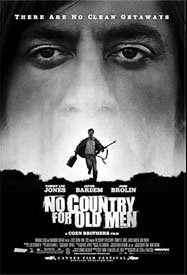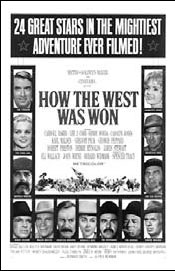Reviews
Films
No Country for Old Men

Directed by Joel and Ethan Coen, starring Tommy Lee Jones, Javier Bardem, Josh Brolin, Woody Harrelson, Kelly Macdonald
The Coens have returned to west Texas with another thriller, No Country for Old Men, also steeped in gore, with bloody trails leading everywhere. It's deeper and more morally complex than the earlier film, though quite as pessimistic.
Closely based on Cormac McCarthy's 2005 novel, a lean, laconic example of what might be called highbrow pulp, the basic plot is fairly familiar, having been used in three classic pictures of the 70s also set in the American south-west - Sam Peckinpah's The Getaway, Don Siegel's Charley Varrick and Karel Reisz's Dog Soldiers - as well as a later one, A Simple Plan, made in Minnesota by an early associate of the Coens, Sam Raimi. This scenario sees a man in sudden, unexpected possession of a case packed with money or drugs that belongs to ruthless gangsters and a lethal cross-country game of cat- and-mouse ensues. The brilliance here resides in the narrative drive, the use of the landscape, the detail of incident and character, the wit and spare poetry of the heightened language and the reflections on ageing, death, fate and changing times.
The year is 1980. As a way of demonstrating to his victim that our lives are ruled by chance, the film's menacing heavy tosses a 1958 quarter-dollar coin that he says has been in circulation for 22 years waiting for this moment. The Vietnam War is over and hippiedom is in its decadent phase. But the terrain is resonant with names familiar from frontier mythology and westerns - the Rio Grande, El Paso, Eagle Pass, Del Rio and Langtry, the place on that dark underside of America alongside the Mexican border where the legendary Judge Roy Bean was "the law west of the Pecos". The once grand hotels built for cattle dealers are now crumbling, grandiose, cheap reproductions of romantic paintings of frontier life, and its landscape decorates the walls of anonymous motel rooms.
Essentially there are four narrative threads. The first, introduced by a long monologue, centers on Sheriff Ed Bell (Tommy Lee Jones), a figure of weather-beaten probity from a family of lawmen, an intelligent, philosophical type with the wry humor of Will Rogers. The second concerns Llewelyn Moss (Josh Brolin, looking very like the young Nick Nolte), a Vietnam veteran, living in a trailer park with his young wife (Scottish actress Kelly Macdonald with a convincing west Texas accent). Moss discovers the bloody aftermath of a drug deal gone wrong, a circle of pick-up trucks and Mexican corpses in the countryside, and he grabs a case containing more than $1 million, sends his wife to her mother's place and goes on the run.
The third strand follows the terrifying Anton Chigurh (Javier Bardem), a lank-haired, cow-eyed, quietly spoken killer who's after the money and the dope. Of no immediately identifiable race, he's resourceful, relentless, psychopathic, a primeval figure seemingly sent by the devil to challenge the human decency of Sheriff Bell. His weapon of choice is a cattle gun, normally used in abattoirs. The fourth strand features Woody Harrelson as a sprightly, recklessly confident Vietnam veteran turned bounty hunter sent to get Chigurh.
From brutal start to ironic finish the movie's tension is constant. The action sequences - chases, shootouts, killings - are handled with great verve and directness. The Coens show us the pain of gunshot wounds and reality of death. The Guardian
How the West Was Won

Directed by Henry Hathaway, John Ford, and George Marshall, starring Gregory Peck, Debbie Reynolds
A massive production that's essentially a patchwork woven together by three different directors, How the West Was Won is a sprawling, dense, inconsistent but nonetheless memorable epic. Henry Hathaway, John Ford, and George Marshall all directed individual segments of this nearly three hour behemoth, which examines the conquering of the American West through the stories of three generations of a pioneering family. Boasting one of the greatest ensemble casts ever assembled, this is the cinematic equivalent of a rickety stagecoach that somehow stays together.
The narrative is spread over five different vignettes. The first, called The Rivers, introduces us to a family named the Prescotts who are trying to make their way down the Ohio River. The death of the parents in a raft accident leads to The Plains, where one of the surviving daughters sings in a saloon and hooks up with a charming gambler en route to the Californian gold mines. The third part, The Civil War, sees a few members of the extended family serve for the North, while The Railroads and The Outlaws sees one of the Prescotts trying to keep the peace and uphold the law.
And then there's the cast, which includes Carroll Baker, Lee J Cobb, Henry Fonda, Carolyn Jones, Karl Malden, Gregory Peck, George Peppard, Debbie Reynolds, James Stewart, Eli Wallach and John Wayne. Admittedly, some fare better than others (Reynolds is a standout) and if you blink you'll miss the Duke's cameo, but it's a miracle that this production didn't boil over with so many chefs stirring the broth. How the West Was Won also has the distinction of being the first film shot in Cinerama (a format which was shown using three projectors and a curved screen). Ben Davey
(China Daily 01/24/2008 page20)














